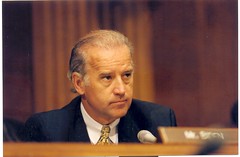 CANDIDATES
CANDIDATESThe Senate came to work on Saturday and, in the end, voted not to work weekends after all.
Although 56 Senators voted to bring debate about President Bush's troop escalation to the floor, 34 others voted not to allow debate - four short of the 60 that would have made the issue fillibuster proof.
You'll note that 56+34 adds up to only 90. One Democrat, Tim Johnson of South Dakota, is recovering from brain surgery. Nine Republicans chose to sit out the vote, saying they support the war so their vote would not affect the anticipated outcome. (Or perhaps they didn't want a nasty old vote to defend down the road a bit. )
In any case, the vote to bring debate about the troop surge to the floor fared better among those Senators who are running for president.
Five voted in favor - Democrats Barack Obama, Hillary Clinton, Joe Biden and Chris Dodd and Republican Chuck Hagel. Republican Sam Brownback voted against bringing the measure to the floor and John McCain stayed on the campaign trail and was not in Washington to vote. He called the vote "meaningless."
McCain warned there are no good options if the surge fails.
Democrat Chris Dodd of Connecticut voted to bring the issue to the floor, but earlier this week didn't profess much enthusiasm for it.
 "We have a sense of the Senate (resolution) on asparagus. They don't mean a whole lot." - Sen. Chris Dodd as quoted by the Associated Press
"We have a sense of the Senate (resolution) on asparagus. They don't mean a whole lot." - Sen. Chris Dodd as quoted by the Associated PressDodd last month authored a bill requiring Bush to get explicit congressional approval for a troop surge. It died in the Senate Foreign Relations Committee.
Hillary Clinton said the vote was important because it got Republicans to go on record against the troop surge (seven of them anyway) "in order to have them as possibly the core of Republicans who will stand with us to cap troops or cut funding."
 Clinton on Friday outlined plans to get the U.S. out of Iraq, calling for a cap of troops stength at Jan. 1, 2007 levels, cutting off funding to the Iraqi government until it rids government security forces of factional militias and a fair distribution of Iraqi oil revenues. Clinton also calls for Bush to begin a phased redeployment of troops to begin within 90 days or face a recission of Congress' approval for the use of force. Clinton's plan would also require certification from the Secretary of Defense that any troops being sent to Iraq are properly equipped and trained before they go.
Clinton on Friday outlined plans to get the U.S. out of Iraq, calling for a cap of troops stength at Jan. 1, 2007 levels, cutting off funding to the Iraqi government until it rids government security forces of factional militias and a fair distribution of Iraqi oil revenues. Clinton also calls for Bush to begin a phased redeployment of troops to begin within 90 days or face a recission of Congress' approval for the use of force. Clinton's plan would also require certification from the Secretary of Defense that any troops being sent to Iraq are properly equipped and trained before they go. Sen. Joe Biden on Thursday proposed a plan of his own, which called for the partitioning or Iraq into three areas - one each to be controlled by the Shia, the Sunnis and the Kurds. The plan also calls for fair distribution of Iraq's oil revenues. In addition, Biden said the U.S. should begin diplomatic efforts to persuade neighboring countries to support Iraq and create a U.N. group to hold neighboring countries to their commitments. Biden's plan also calls on the military draw up a blueprint for completion of U.S. troop withdrawal by the end of next year.
Sen. Joe Biden on Thursday proposed a plan of his own, which called for the partitioning or Iraq into three areas - one each to be controlled by the Shia, the Sunnis and the Kurds. The plan also calls for fair distribution of Iraq's oil revenues. In addition, Biden said the U.S. should begin diplomatic efforts to persuade neighboring countries to support Iraq and create a U.N. group to hold neighboring countries to their commitments. Biden's plan also calls on the military draw up a blueprint for completion of U.S. troop withdrawal by the end of next year. John Edwards, no longer in the Senate but very much in the thick of the Democratic race, proposed Friday that troops be cut to 100,000 immediately by capping the funding for troops at that level. He also proposed that all troops be out
 of Iraq in the next 12 to 18 months.
of Iraq in the next 12 to 18 months."Nearly a month ago, I called on Congress to block the President's escalation of war. Unfortunately, while Congress has been debating Iraq, President Bush has been surging troops into Iraq. The escalation is underway, so blocking it is no longer enough - now we have to take the next step and cap funding to mandate a withdrawal" Edwards said in a press release from his campaign.

No comments:
Post a Comment